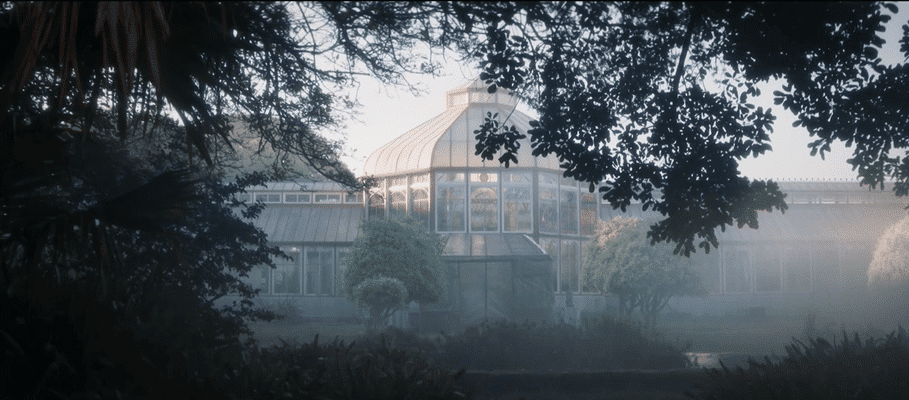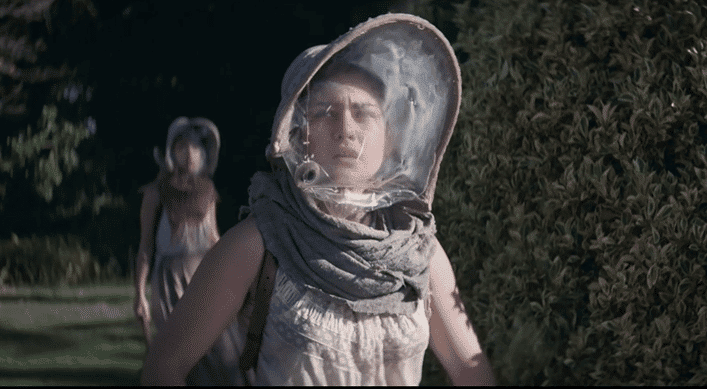
In dystopian worlds, there’s a fascination with the possibility of closed environments. These small bastions of normality in the face of threats from beyond appeal to us, the more so when it ever becomes clear that – where humanity is concerned – nothing can ever be truly hermetically sealed: against hostile outsiders, environmental catastrophe, or the outbreak of disorder from within. Films like Dawn of the Dead (1978) with its shopping mall, or Snowpiercer (2013) with its class-divided train carriages each showcase a different aspect of this idea; Glasshouse (2021) goes a step further and has aspects of all those potential sources of breakdown. However, its handling of themes is very different, almost languid, and it’s a masterclass in slow-burn cinema – taking a very different approach to this kind of subject matter.
In what at first seems to be an idyll, a group of young siblings live in a large Victorian greenhouse: here, they are presided over by their mother, a formidable matriarch (Adrienne Pearce) whose prim, coiffed appearance is broadly in keeping with the fin de siècle vibes of their home. Clearly, all is not as it first seems: when going out into the grounds, the family needs to don protective clothing, and they fiercely guard their space with armed sentry duty, shooting anyone who gets too near (then making full use of the human remains, to feed their crops). Prim and proper these people may appear, but they have no qualms about carving up and using any biological material at their disposal.
This usually-genteel looking set-up has, we soon come to understand, endured a run of pandemics, culminating in something called ‘The Shred’, which destroys aspects of a person’s cognitive function. It doesn’t render them mindless zombies exactly, but it erodes their memory and rationality, leaving them shells of their former selves. It’s an unpleasant condition, and it makes perfect sense that this family would do everything they can to avoid it. To maintain order, they closely follow a number of what Mother calls their ‘laws and litanies’, at the heart of which is the need to reject all outsiders. But even at its most orderly, the hairline fractures within the family unit are already beginning to show. Gabe (Brent Vermeulen), the only male in the group, is largely unable to participate in rituals along with the others, as much as he tries; brutal nightmares necessitate that he be restrained at night. In a house populated with young, elderly or simply physically weaker females, his volatility is a cause of watchful, sad concern for the others.
And then, of course, a moment of weakness sees the two oldest girls, Bee and Evie (Jessica Alexander and Anja Taljaard) let their guard down when a desperate man approaches the house’s perimeter. They shoot at him, but only wound him, then pleading with Mother to allow them to nurse him back to health. As they’ve already brought him into the outermost part of the property, Mother begrudgingly agrees. The hairline fractures spread rapidly, not least because the presence of this man (the distracting Hilton Pelser) highlights the absence of another member of the family, Luca – a brother who left, but apparently disappeared without trace.
This series of developments may look very familiar as written, but it’s the way Glasshouse handles all of this which marks it out as an unusual piece of filmmaking. It opts for a sober, scaled-down approach throughout, weaving an atmosphere and aesthetics which call to mind Picnic at Hanging Rock (1975) and Angels and Insects (1995), amongst others. There’s none of the usual grime and distress of post-apocalyptic cinema here. Plot-wise, at least initially, it’s hard not to think of The Beguiled (1971): there’s so much here about the presence of a mysterious male outsider, who soon feels confident and superior enough to game his way through his interactions with the women, though he fails to realise his part to play in this drama. There’s a dash of Gilead in here too, on occasion. And, ultimately, why not prioritise cleanliness and order, when faced with such turmoil elsewhere? If you can do laundry, then why not do laundry? In a post-pandemic wipe-out, god knows there isn’t much else to do. There’s only so many people to shoot.
With its minimal, but carefully-written dialogue, the film does just enough to balance exposition against atmosphere; it hints at a bigger picture, both in terms of the world at the gates and the emotional lives of the characters. This is, after all, a very restricted location with only a small number of players to inhabit it. The very deliberate slow pace allows plenty of time to enjoy the way the film looks, and additionally it is dotted with significant symbolism (let’s add here that some of the possibly accidental double entendres in the script give the game away slightly, even before the sexual symbolism becomes clearer). However, the most poignant aspect of the film is in its dealings with the topic of memory – what is is to forget, and be forgotten. In this, the film manages some surprises, too – surprises which really hooked this reviewer. Glasshouse is a clever, beautiful and often verdant film, carefully realised and – for those with the patience – very rewarding. It only remains to add that this is a first feature by director and co-writer Kelsey Egan, which is pretty extraordinary.
Glasshouse (2021) is available on digital/On Demand on July 12th 2022.
